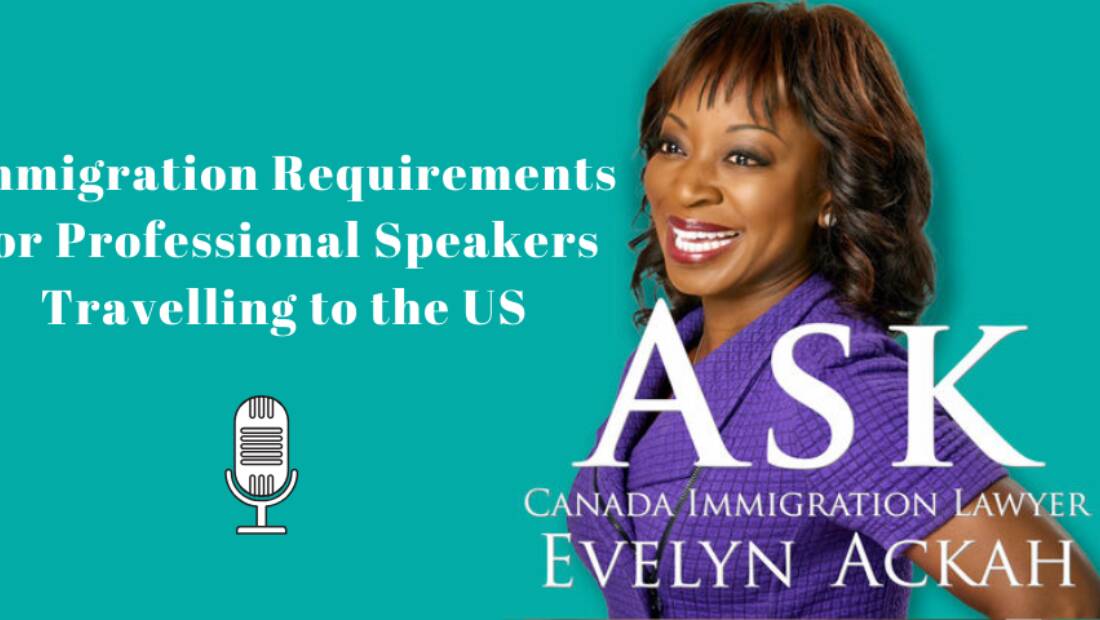Or listen on your favourite podcast app
Today's podcast is a live webinar presented by Evelyn Ackah, Canada Immigration Lawyer to the Canadian Association of Professional Speakers: CAPS.
Practical Information for Professional Speakers Travelling to the US
What Is a Business Visitor?
As a Canadian going to the United States, business visitor activity is not work from an immigration perspective. It's more about are you going there with a prearranged engagement? Have you been paid? Are you being paid in the U.S.? You don't want that if you don't have a work permit. So business visitor, we can get honorariums, you can get your expenses paid for, there's a lot more flexibility.
U.S. Visa Options
NAFTA B-1 and TN visas are probably the main U.S. visa options that will affect a speaker travelling to the United States. An O and P visa could also that'll probably affect you.
You are not actually seen to be entering the U.S. labor market. Generally speaking as a NAFTA business visitor:
- you have to be a Canadian citizen
- you have to be going down for meetings
- you can do sales activity
- you can do trainings depending on the context of training
Consult a Canadian immigration professional before you cross the border! At Ackah Business Immigration Law, our goal is to make Crossing Borders Seamlessly a reality - for work, for family for life. We want to make it smooth as possible for you to be as successful as possible, and y ou need to have information before you can make decisions.
Contact Ackah Business Immigration Law today
at (403) 452-9515 Ext. 100 or 1-800-932-1190
or email us directly at contact@ackahlaw.com
Transcription
Evelyn L. Ackah:
How many of you travel to the U.S. on a regular basis? Okay. For professional speaking, How many of you have had problems crossing the border? All right. So this is why we're here. I think it's important that you understand the law behind some of the challenges you might be having as you enter the U.S. and how to present yourself hopefully to improve the situation as you go forward.
Evelyn L. Ackah:
As professional speakers entering the United States it's important to know what they're looking for. There are some words you shouldn't say. Work is a four-letter word for immigration law. You need to be clear. And it is very gray as well and so some of the things we're going to talk about, they're nuanced, they're not guaranteed 100% but it's about improving your expertise as you go at it each time it'll get better and better and better. So, that's what I'm hoping that we'll be able to share with you today.
Evelyn L. Ackah:
So, the law, the boring stuff. And these presentations Faith will make them available to everybody. I literally didn't finish till yesterday because it's been that busy for us year-end at the firm. So everything has been given to Faith and she's going to make sure you all get them by email. There are also a couple of other materials that I included besides the presentation that I think will help you understand how you should present if you go into the states.
Evelyn L. Ackah:
So, U.S immigration is governed by a crazy amount of laws, regulations, policies, guidelines, constantly changing. And so, I don't expect that any lay person walking over the border or going to the airport will necessarily need to know it all but you need to understand a little bit of the framework and what they're looking for and what you need to say and so this is what we're going to talk about. I've been practicing immigration law for 13 years. I started law as a corporate lawyer in Toronto.
Evelyn L. Ackah:
I worked on Bay Street then I moved to immigration in 2000 because I just liked it way more and because it affects people. Even if my clients are corporations the fact that there are people behind the applications that I'm doing for the corporations makes it so much more enjoyable than doing transactions for [inaudible 00:03:28] companies. And so, I've been doing this for a while and when 9-11 happened everything changed literally overnight. The level of security, the whole department of Homeland Security was created post 9-11 and it's changed the way we cross the border and how we have to conduct ourselves across the border.
Evelyn L. Ackah:
The other thing I've noticed doing Canadian and U.S. immigration law primarily, we do some other countries as well, is that nothing stays the same. Every day I come into the office and something has happened, "Oh my goodness they ended this program." "What?" You're in the midst of putting applications together and the government just like that will change the law, the policies, the guidelines, the expectations. And so, you can't always assume that the application you worked with maybe to get in as a TN five years ago is going to be the same application. You need to make sure even if it's just a cursory review check the law, talk to your advisor, whoever helped you, make sure nothing has changed because it's constantly changing. You can't regurgitate the same old, same old.
Evelyn L. Ackah:
All right. So one of the main issues with immigration becomes when you get up there at the customs desk what are you doing? You're going in for what? Business, pleasure. You all probably say pleasure when you're going for business. It's important to tell the truth. So, one of the things I want you to understand is the context of work and employment, very, very significant language in the States. So, the law is that generally if you're being paid whether it's a salary, a commission, speaking fees, immediately you move into what might be considered work and there are very few exceptions to that. So, the language you use is so significant. Work and employment if different from I'm going in to speak at a conference, I'm going in for a business meeting, I'm going in to sell my services, that's business visitor activity and we're going to get into the details in the distinction.
Evelyn L. Ackah:
You have to understand business visitor activity is not work from an immigration perspective. It's more about are you going there with a prearranged engagement? Have you been paid? Are you being paid in the U.S.? You don't want that if you don't have a work permit. So business visitor, we can get honorariums, you can get your expenses paid for, there's a lot more flexibility. Work permit, TN, we'll talk about some of the other categories, if you're getting paid you need to get a work permit. And if you're getting paid in a way that is clear and explicit and you're being remunerated, let's say if you're going down as a consultant and you spent six, eight, 10 visits down there and you have a contract for services that's when you should get a work permit absolutely. Don't mess around with it. It really affects you if you have problems crossing the border. So we'll talk about some of the implications as well.
Evelyn L. Ackah:
One thing that I've been seeing over the years is the level of inconsistency. You can come in one day and everything is easy and then the next day you get to sent to secondary and they practically strip search you. Do you know what I mean? It really is challenging. And so, you can't ever rely on the experience you had a week ago. So, it's about understanding what you need to put across, how you need to present, how nice you have to be to the officer's. Even me, when I go down for business, I see my clients for meetings, touch base with them in Houston, whatever, I don't wear my Lulu lemon pants though I'd love to when I travel I can't when I cross the border. Because you have to look the part of a business visitor when you appear and they make their decision on that two minute engagement with you. We'll talk more about that as well about how the importance of presenting could affect your application.
Evelyn L. Ackah:
So work employment you need a work permit, meetings, sales, the odd presentation that you're being paid in Canada for versus here is a check from the U.S. company to you in the U.S. those are different things. But always what happens when you get to the port is they ask you, "What are you going for?" The reason they ask is they're trying to understand what your intention is. Intentionality for immigration law is the foundation of everything we do. So you have to walk up and say, "I have non-immigrant intention," which means, "I'm coming in as a visitor. I'm going for a meeting." They want to determine if you're actually coming in, you want to become a permanent resident of the U.S., you want to stay, you're never going to go back.
Evelyn L. Ackah:
They're trying to weed out what is your intention here. And your job is to meet that burden by ensuring they understand, "I have a ticket back in three days. I am going for meetings for a short term purpose. I'm not going to spend six months here." That all takes away from your intention to be a non-immigrant if you have long term travel and you're there for a long time." And then if they Google you because that's another strategy that they'll look to and they see that you've got speaking engagements for three months and you're sitting in the U.S. for three months it's over. Because you need to plan strategically. If you are going to do that kind of work for that long, for that duration, that's when you have to start considering getting a work permit. It moves beyond just the short term business visitor. What is your intention? And you need to satisfy them that, that's our obligation.
Evelyn L. Ackah:
So, we're going to talk through some of the U.S. visa options. We're going to focus primarily on NAFTA B-1 and TN visas because those are the main ones that'll probably affect you. And then I'll highlight the O and P quickly, we can always talk offline and I can give you additional resources. But first and foremost, to qualify under NAFTA you need to be a Canadian citizen, that's it. So if you're a permanent resident and a lot of people are permanent residents and think, "Back in the day I could go to the States." Everything has changed so unless you are a Canadian citizen and you go to that extra level you are not eligible to be processed at the border or at the airport. That's when you need to go through the consulate and it's a much more complicated application. So I'm going to assume everybody here is a Canadian citizen and is under NAFTA just for this purpose. And I'll talk a little bit about those who don't fit under NAFTA and what the requirements are for that. That takes a little longer but it's also very doable.
Evelyn L. Ackah:
So, this is the main category that all my clients call and say, "Do I really need a letter? Do I really need a work permit? We're going for a week or two weeks of training what do I need?" And so, there's always the challenge of practical, strategic, and legal and I try to give all three. So, sometimes if you're going for a week for a company that may have U.S. operations as well, we'll do a letter, we'll do a NAFTA business visitor letter. It verifies what you're doing, it shows it's short term, it shows you're not working, you're Canadian, you're going to meet with your colleagues, share your best practices, whatever the strategy is. That makes sense but when you tell me you have to go for three months okay let's step back and talk about this.
Evelyn L. Ackah:
And if I can get you a work permit I will because it's not easy to prove your intention is non-immigrant the longer you're going for, the challenge gets higher for you. So, if I can show that either you are going down for three months and you really aren't entering the labor market and you have to travel every week to come back and forth it's worth getting a work permit. Because every time you travel you get somebody else and that leaves a lot of room for problems to occur. And I don't want my clients to suffer at the airport or at the border. So generally speaking as a NAFTA business visitor is short term, you have to be Canadian citizen, you have to be going down for meetings. You can do sales activity. You can do training depending on the context of training, we'll talk about that.
Evelyn L. Ackah:
And generally it's to promote international business that's what NAFTA was always about. But it seems to be restrictive, they seem to think sometimes with the Canadians going down, "Why are you coming down and taking jobs from Americans?" And there's always this justification. They don't understand that tons and tons of Americans are here, that we have of course order and we appreciate the Americans in the form of visitors here. It's not like that in the States, your burden is to prove that you're doing something that falls into their very restrictive category and say the truth, get it over with. I always say, "Don't say too much but say just enough." And I'll talk about some of those practical points.
Evelyn L. Ackah:
So, the NAFTA business visitor category I've already said you have to be a Canadian. You have to have a valid reason for being in the U.S. what is that reason? You have to know that they're going to Google you, put your name in, "We see you're speaking here." "Yes. I am a guest speaker. I'm getting an honorarium. I'm the only one that can talk on this specific issue. They have invited me. I'm coming in for three days they are paying my expenses, I'm out." Perfect requirements here that you're not actually getting a check in the U.S. They might wire you funds when you're in Canada. They may take care of your honorarium. That's a different issue because you're not actually seeing to be entering the U.S. labor market, short term problem.












